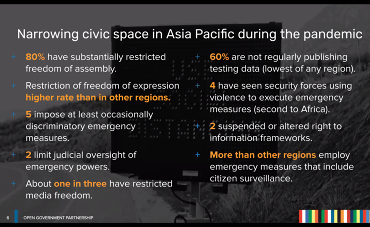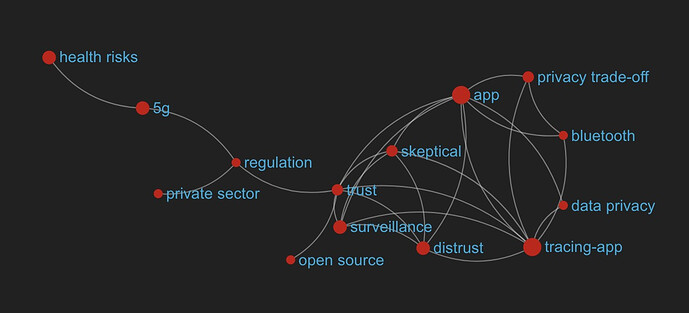This is true.
Tracing apps were a big topic during the session, therefore I thought this might be interesting here:
@alberto is going to question data scientists from DeLab in this webinar next week (3rd of June) about how to use their data to validate results 1-4 listed above from the surveillance pandemic session.
Result 1: there is cause to worry, but also leverage for defense
Result 2. Contact tracing apps are ineffective against COVID-19, but may help in the next pandemic
Result 3. Immunity passports are an unworkable idea
Result 4. Locational data are impossible to anonymize, and of limited utility. Capacity for data governance is bad
Join us if you are interested in that discussion and want to discuss how to understand and interpret data rather then just receiving it. And of course, you are also welcome to ask about the origin of that data.
I want to revamp this thread in view of a couple of disturbing developments I am seeing. They are not directly related to the “magic COVID app”, but they do resonate with some of the arguments we explored in this event.
1. Restricted freedoms in Asia-Pacific
Earlier this week, the Open Government Partnership held this meeting. They found robust evidence that states inclined towards authoritarianism exploited the pandemic to increase surveillance and restricts liberties. Most countries in the region are also restricting the publication of data on the pandemic itself, presumably so that they control the narrative and keep their nations in a perpetual state of fear. Authoritarians love fear, because it makes government overreach more acceptable.
I am not convinced that this is only an Asian phenomenon. In my own native Italy, 19 regions out of 20 refuse to publish open data on COVID-19 ([thoughtful post by Matteo Brunati]
(Il governo (non è) aperto durante la pandemia: serve una spinta - Casual.info.in.a.bottle - Il blog di Matteo Brunati), in Italian).

2. Smart city infrastructure re-deployed to counter-demonstration surveillance in the USA
The city of San Diego, in progressive California, has 4,000 smart traffic lights. Which have cameras. Which store their footage on some server farm. Turns out San Diego police are now accessing that footage in search of material to incriminate Black Lives Matter protestors. The whole thing had been predicted by the EFF in 2017, and this lends some strength to slippery slope-type arguments whenever someone wants more monitoring and more data on the spaces where humans live.
We are still very far from a bottom line on the consequences of SARS-COV-2 on the Internet and how humans use it. But the shadows are deepening, and I fear that the opportunists thinking the pandemic is a good excuse for getting more surveillance tech in place… are mostly right.
I find that this thread is a nice place to store information and reflections about how the COVID-19 pandemic interacts with surveillance matters. Most of this information has a technological side.
The latest is this: the government of Romania has decided to “transmit the entire database” of clinical data treated by the health authorities, currently stewarded by the Ministry of Health, to the Ministry of Internal Affairs (link, Romanian).
I know of another case where the Ministry of Internal Affairs ended up making health policy: Italy. As lockdown was decided, the government initially allowed daily exercise outdoors, done individually. This is, of course, consistent with the recommendations of any doctor: exercise is an essential component of health. However, the initial regulation was, in a few days, superseded by a new one, after the Minister of Internal Affairs complained that “the only way to check people where compliant was to lock them inside at all times”. Doctors protested, but could not get the regulation to be overturned.
In general, when health care is entrusted to the police, and powerful digital surveillance tech is brought in… I don’t know, it just smells bad to me.
EDIT: some trust issues are indeed showing in the preliminary coding of the NGI Forward corpus. ![]()
I suspect that one worry is that if you give over to the government temporary powers that restrict your basic freedom of movement, would those powers be given back, after the danger passes?
In the domain of Internet tech it’s more surveillance than restrictions. But yes.
I’m trying to think of a time when a government voluntarily gave back powers when they didn’t need them after some crisis, excluding adding and then taking away troops or police for a given situation. No luck so far.
I was doing some prep work for the event on the 29th and landed in this thread again - how long ago it feels…
